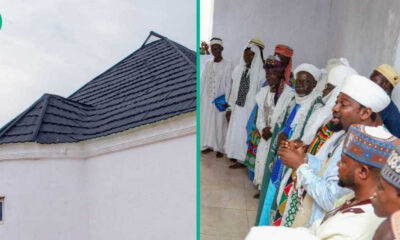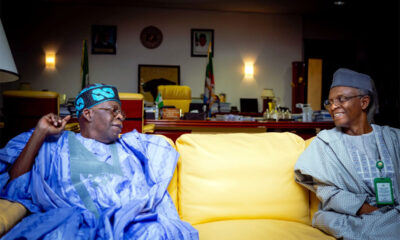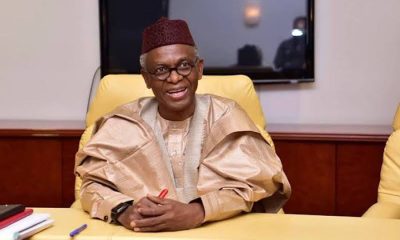Opinion
Zanga-Zanga and Tinubu’s crumbling northern alliance – Farooq Kperogi

Zanga-Zanga and Tinubu’s crumbling northern alliance – Farooq Kperogi
The 10-day nationwide #EndBadGovernance protests that end today, known by the reduplicative compound “Zanga-Zanga” in Hausaphone northern Nigeria, have ruptured the coalition that President Bola Ahmed Tinubu managed to build with a portion of the northern Nigerian Muslim political establishment since 2014, which put Muhammadu Buhari in power in 2015 and 2019 and him in 2023.
But this Zanga-Zanga-inspired rupture also reveals the initial precarity and fragility of the strange-bedfellows coalition. Buhari and Tinubu were previously fierce political adversaries who distrusted each other’s motives and undermined each other. Their alliance was more accurately a political scaffold that papered over their contradictions for a temporary gain, which was the ouster of Goodluck Jonathan from power.
Tinubu’s associates and acolytes in the Southwest, who said they protected Buhari from revolt in their region even when he bungled governance with uncommon ineptitude, are understandably miffed at the rawness, fierce intensity, and undiluted anti-Tinubu fervor of the protests in northern Nigeria.
They are wondering why Buhari, his associates, and even the APC establishment in the North didn’t return the favor. The answers are obvious, but people in power are often blind to the obvious, especially if the obvious is disquieting.
First, Buhari and his supporters know that the Tinubu group, which had a tight leash on the Southwest political space, didn’t protect Buhari from the consequences of his infernal incompetence out of any high-minded considerations. They did so because they needed power after Buhari’s term in office. It was unvarnished calculative opportunism.
Since Buhari’s people have no expectation of any kind of requital from Tinubu, like Tinubu did from them, they felt no obligation to protect or explain away Tinubu’s own hard-hearted incompetence. The chase often stops after a conquest. Men who woo women can relate to this sentiment.
Second, the misery that Tinubu’s simultaneous policies of never-before-seen astronomical petrol price increase and devaluation of the naira unleashed on the country are felt more deeply in the North than in any part of the country because of the preexisting multidimensional poverty in the region and the pervading insecurity that makes farming almost impossible.
READ ALSO:
- Police explains search operation at NLC headquarters
- Woman arrested for cutting off step-grandson’s lips with hot kn!fe
- Bandits kill village head, abduct Islamic scholar, journalist’s wife, children in Kaduna
Money is now both hard to find and worthless when it is found, and food is both hard to find and unaffordable when it is found. That is an unprecedentedly profound, not to mention unsurvivable, existential torment.
Two days after the #EndBadGovernance protests started, I told someone that many people in the North have been rendered so desolate, so destitute, and so despondent by the economic crunch that they are looking to cash in on the protests to commit suicide by police bullets because Islam forbids suicide.
Islam teaches that committing suicide guarantees an unfettered passage to the hottest depths of hellfire in the hereafter. I said many people who couldn’t survive the pain and humiliation of perpetual hunger might tempt security forces to shoot them so they could end it all and not fear that they would provoke the wrath of their Creator for committing suicide.
Of course, this is twisted thinking because a famous hadith, which every Muslim who took Islamic Studies in secondary school knows, says “Actions shall be judged according to intention.”
Well, my predictions turned out to be accurate. A friend shared a video of scores of protesters in a northern city chanting, “da yunwa ta kashe mu, da ma bullet ya kashe mu” (rough translation: “Instead of dying of hunger, we would rather be killed by a bullet”) as they confronted gun-wielding military and police officers.
There is also the viral video of protesters bursting into the Zamfara State Government House in Gusau and defying, even daring, menacing, gun-toting soldiers who tried to stop them. Several such scenes have been replicated throughout the North.
The mistake the government is making is to dismiss the protests as entirely politically motivated. They are not. Even if they wanted, Buhari and his associates couldn’t stop the protests both because the shelf life of Buhari’s “magic” has expired (his own house was besieged in Daura, and he had been pelted with stones while he was in power in cities like Kano and Maiduguri where he had been idolized) and because the extent of anguish people are going through now is unappeasable.
Apart from the usual criminals of opportunity (who exploit every unrest to steal and destroy), the vast majority of protesters think their only hope of living is to risk death and push back at policies that kill them slowly but surely. You can’t persuade people who have nothing to lose by dying.
That was why American author Dan Groat pointed out in his 2014 book titled In Monarchs and Mendicants, “Not interested in scarin’ anybody, but people with good sense are afraid of a man with nothin’ to lose.” Lance Conrad echoed this in his book The Price of Nobility when he said, “Only a fool would underestimate a man with nothing to lose.”
People who weren’t exempt from the rage of protesters can’t stop protesters from protesting.
The self-inflicted attenuation of Tinubu’s political capital in the North plays into the old debate in the Southwest about the best coalitional strategy to attain and retain power for the Yoruba.
READ ALSO:
- [UPDATED] BREAKING: Plane crash in Brazil’s São Paulo state kills all 62 on board
- Navy loses officer in Rivers drowning vessel after rescuing 59 civilians
- Oladipo Diya’s younger brother, ex-lawmaker Wole Diya, dies at 63
The Chief Obafemi Awolowo strategy, which Afenifere still believes in, sees the Muslim North as a competitor and not an ally. The Awo strategy for getting power is to build an alliance between the entire South and Northern Christians.
But the Chief Ladoke Akintola template sees the Muslim North as a strategic partner in light of the deep historical and cultural ties that bind Yoruba people and several linguistic, ethnic, and cultural groups in the Muslim North, such as Borgu, Nupe, Igala, and Hausa people. (Read my October 9, 2021, column titled “Arewa and Oduduwa More Alike than Unlike.”) This is hardly surprising because even though Akintola was a Christian, he was from Ogbomoso whose traditional ruler traces ancestral roots to Borgu.
Chief MKO Abiola—and now President Tinubu—subscribe to the Akintola template. Abiola was briefly vindicated when he won the June 12, 1993, presidential election with enormous support from the North, including Kano, his opponent’s home state.
But the revocation of his epochal electoral triumph by a Northern military head of state—and the decidedly ethnic and regional character the fight for and the opposition to his mandate later took—appeared to justify the distrust of the Muslim North by the Awo group, which nonetheless gave full-throated support to Abiola to reclaim his mandate.
Tinubu, undeterred by Abiola’s experience, reinvented the Akintola template. It’s as if he wanted to prove that he could tread the same path and get to the destination that Abiola couldn’t get to. That must be why he called his presidential bid “Renewed Hope.” Abiola’s was “Hope.” Like Abiola, he chose a Muslim running mate. And, like Abiola, his running mate is a Kanuri man from Borno.
With the Muslim North now souring on him only one year into his first term and the unlikelihood of his ever recovering whatever goodwill he had from the region if he continues with his economic policies that push people to the brink of the existential precipice, the Awo/Afenifere group may be having the last laugh.
So, what should he do? The best option is to discard the IMF/World Bank neoliberal policies he’s enamored with (which have never worked anywhere in the world) and embrace Awolowo’s welfarist capitalist template of governance that puts the development and wellbeing of people at the center of policies. That may restore his goodwill with the North—and even earn him more support elsewhere.
The other options are non-starters, but I’ll mention them anyway. Like Chief Olusegun Obasanjo who won his first term with the support of the Muslim North, but who later used the Awo/Afenifere template to get a second term, Tinubu can court the Christian North and galvanize the South. Goodluck Jonathan used this template in 2011 and won.
The problem is that if Peter Obi runs in 2027, and I don’t see any reason why he won’t, Tinubu won’t be able to galvanize the South into a unified voting bloc. And, although the worst fears of his Muslim-Muslim ticket among Christians haven’t materialized, northern Christians are unlikely to embrace him wholeheartedly, however hard he tries to woo them.
In other words, Tinubu is cooked, as Gen Zs say. Anything short of bringing down the cost of petrol, restoring the value of the naira, and making everyday things affordable will doom Tinubu’s first term and deny him a second term because he is now effectively a political orphan.
Zanga-Zanga and Tinubu’s crumbling northern alliance – Farooq Kperogi
Farooq Kperogi is a renowned Nigerian columnist and United States-based Professor of Media Studies.
Opinion
El Rufai’s Arise News mind game with Ribadu, By Farooq Kperogi

El Rufai’s Arise News mind game with Ribadu, By Farooq Kperogi
El Rufai’s Arise News mind game with Ribadu, By Farooq Kperogi
Opinion
Oshiomhole: Behold the 13th disciple of Christ

Oshiomhole: Behold the 13th disciple of Christ
Opinion
AFCON 2025: Flipping Content Creation From Coverage to Strategy

AFCON 2025: Flipping Content Creation From Coverage to Strategy
By Toluwalope Shodunke
The beautiful and enchanting butterfly called the Africa Cup of Nations (AFCON) emerged from its chrysalis in Khartoum, Sudan, under the presidency of Abdelaziz Abdallah Salem, an Egyptian, with three countries—Egypt, Sudan, and Ethiopia—participating, and Egypt emerging as the eventual winner.
The reason for this limited participation is not far-fetched. At the time, only nine African countries were independent. The remaining 45 countries that now make up CAF’s 54 member nations were either pushing Queen Elizabeth’s dogsled made unique with the Union Jack, making supplications at the Eiffel Tower, or knocking at the doors of the Palácio de Belém, the Quirinal Palace, and the Royal Palace of Brussels—seeking the mercies of their colonial masters who, without regard for cultures, sub-cultures, or primordial affinities, divided Africa among the colonial gods.
From then until now, CAF has had seven presidents, including Patrice Motsepe, who was elected as the seventh president in 2021. With more countries gaining independence and under various CAF leaderships, AFCON has undergone several reforms—transforming from a “backyard event” involving only three nations into competitions featuring 8, 16, and now 24 teams. It has evolved into a global spectacle consumed by millions worldwide.
Looking back, I can trace my personal connection to AFCON to table soccer, which I played alone on concrete in our balcony at Olafimihan Street—between Mushin and Ilasamaja—adjacent to Alafia Oluwa Primary School, close to Alfa Nda and Akanro Street, all in Lagos State.
Zygmunt Bauman, the Polish-British sociologist who developed the concept of “liquid modernity,” argues that the world is in constant flux rather than static, among other themes in his revelatory works.
For the benefit of Millennials (Generation Y) and Generation Z—who are accustomed to high-tech pads, iPhones, AI technologies, and chat boxes—table soccer is a replica of football played with bottle corks (often from carbonated drinks or beer) as players, cassette hubs as the ball, and “Bic” biro covers for engagement. The game can be played by two people, each controlling eleven players.
I, however, enjoyed playing alone in a secluded area, running my own commentary like the great Ernest Okonkwo, Yinka Craig, and Fabio Lanipekun, who are all late. At the time, I knew next to nothing about the Africa Cup of Nations. Yet, I named my cork players after Nigerian legends such as Segun Odegbami, Godwin Odiye, Aloysius Atuegbu, Tunji Banjo, Muda Lawal, Felix Owolabi, and Adokiye Amiesimaka, among others, as I must have taken to heart their names from commentary and utterances of my uncles resulting from sporadic and wild celebrations of Nigeria winning the Cup of Nations on home soil for the first time.
While my connection to AFCON remained somewhat ephemeral until Libya 1982, my AFCON anecdotes became deeply rooted in Abidjan 1984, where Cameroon defeated Nigeria 3–1. The name Théophile Abéga was etched into my youthful memory.
Even as I write this, I remember the silence that enveloped our compound after the final whistle.
It felt similar to how Ukrainians experienced the Battle of Mariupol against Russia—where resolute resistance eventually succumbed to overwhelming force.
The Indomitable Lions were better and superior in every aspect. The lion not only caged the Eagles, they cooked pepper soup with the Green Eagles.
In Maroc ’88, I again tasted defeat with the Green Eagles (now Super Eagles), coached by the German Manfred Höner. Players like Henry Nwosu, Stephen Keshi, Sunday Eboigbe, Bright Omolara, Rashidi Yekini, Austin Eguavoen, Peter Rufai, Folorunsho Okenla, Ademola Adeshina, Yisa Sofoluwe, and others featured prominently. A beautiful goal by Henry Nwosu—then a diminutive ACB Lagos player—was controversially disallowed.
This sparked outrage among Nigerians, many of whom believed the referee acted under the influence of Issa Hayatou, the Cameroonian who served as CAF president from 1988 to 2017.
This stroll down memory lane illustrates that controversy and allegations of biased officiating have long been part of AFCON’s history.
The 2025 Africa Cup of Nations in Morocco, held from December 21, 2025, to January 18, 2026, will be discussed for a long time by football historians, raconteurs, and aficionados—for both positive and negative reasons.
These include Morocco’s world-class facilities, the ravenous hunger of ball boys and players (superstars included) for the towels of opposing goalkeepers—popularly dubbed TowelGate—allegations of biased officiating, strained relations among Arab African nations (Egypt, Algeria, Tunisia, and Morocco), CAF President Patrice Motsepe’s curt “keep quiet” response to veteran journalist Osasu Obayiuwana regarding the proposed four-year AFCON cycle post-2028, and the “Oga Patapata” incident, where Senegalese players walked off the pitch after a legitimate goal was chalked off and a penalty awarded against them by DR Congo referee Jean-Jacques Ndala.
While these narratives dominated global discourse, another critical issue—less prominent but equally important—emerged within Nigeria’s media and content-creation landscape.
Following Nigeria’s qualification from the group stage, the Super Eagles were scheduled to face Mozambique in the Round of 16. Between January 1 and January 3, Coach Eric Chelle instituted closed-door training sessions, denying journalists and content creators access, with media interaction limited to pre-match press conferences.
According to Chelle, the knockout stage demanded “maximum concentration,” and privacy was necessary to protect players from distractions.
This decision sparked mixed reactions on social media.
Twitter user @QualityQuadry wrote:
“What Eric Chelle is doing to journalists is bad.
Journalists were subjected to a media parley under cold weather in an open field for the first time in Super Eagles history.
Journalists were beaten by rain because Chelle doesn’t want journalists around the camp.
Locking down training sessions for three days is unprofessional.
I wish him well against Mozambique.”
Another user, @PoojaMedia, stated:
“Again, Eric Chelle has closed the Super Eagles’ training today.
That means journalists in Morocco won’t have access to the team for three straight days ahead of the Round of 16.
This is serious and sad for journalists who spent millions to get content around the team.
We move.”
Conversely, @sportsdokitor wrote:
“I’m not Eric Chelle’s biggest supporter, but on this issue, I support him 110%.
There’s a time to speak and a time to train.
Let the boys focus on why they’re in Morocco—they’re not here for your content creation.”
From these three tweets, one can see accessibility being clothed in beautiful garments. Two of the tweets suggest that there is only one way to get to the zenith of Mount Kilimanjaro, when indeed there are many routes—if we think within the box, not outside the box as we’ve not exhausted the content inside the box.
In the past, when the economy was buoyant, media organisations sponsored reporters to cover the World Cup, Olympics, Commonwealth Games, and other international competitions.
Today, with financial pressures mounting, many journalists and content creators seek collaborations and sponsorships from corporations and tech startups to cover sporting events, who in turn get awareness, brand visibility, and other intangibles.
As Gary Vaynerchuk famously said, “Every company is a media company.” Yet most creators covering AFCON 2025 followed the same playbook.
At AFCON 2025, most Nigerian journalists and content creators pitched similar offerings: on-the-ground coverage, press conferences, team updates, behind-the-scenes footage, analysis, cuisine, fan interactions, and Moroccan cultural experiences.
If they were not interviewing Victor Osimhen, they were showcasing the stand-up comedy talents of Samuel Chukwueze and other forms of entertainment.
What was missing was differentiation. No clear Unique Selling Proposition (USP). The result was generic, repetitive content with little strategic distinction. Everyone appeared to be deploying the same “Jab, Jab, Jab, Hook” formula—throwing multiple jabs of access-driven content in the hope that one hook would land.
The lesson is simple: when everyone is jabbing the same way, the hook becomes predictable and loses its power.
As J. P. Clark wrote in the poem “The Casualties”, “We are all casualties,” casualties of sameness—content without differentiation. The audience consumes shallow content, sponsors lose return on investment, and creators return home bearing the “weight of paper” from disappointed benefactors.
On November 23, 1963, a shining light was dimmed in America when President John F. Kennedy was assassinated.
As with AFCON today, media organisations sent their best hands to cover the funeral, as the who’s who of the planet—and if possible, the stratosphere—would attend. Unconfirmed reports suggested that over 220 VVIPs were expected.
While every newspaper, radio, and television station covered the spectacle and grandeur of the event, one man, Jimmy Breslin, swam against the tide. He chose instead to interview Clifton Pollard, the foreman of gravediggers at Arlington National Cemetery—the man who dug John F. Kennedy’s grave.
This act of upended thinking differentiated Jimmy Breslin from the odds and sods, and he went on to win the Pulitzer Prize in 1986.
Until journalists and content creators stop following the motley and begin swimming against the tide, access will continue to be treated as king—when in reality, differentiation, aided by strategy, is king.
When every journalist and content creator is using Gary Vaynerchuk’s “Jab, Jab, Jab, Hook” template while covering major sporting events, thinkers among them must learn to replace one jab with a counterpunch—and a bit of head movement—to stay ahead of the herd.
Toluwalope Shodunke can be reached via tolushodunke@yahoo.com
-

 Education2 days ago
Education2 days agoCheck Your Name: UNILORIN Releases Updated NELFUND Refund List for 2024/2025 Students
-

 News2 days ago
News2 days agoOsogbo Sons and Daughters Mark 5th Anniversary with Awards, Political Undertones
-

 metro3 days ago
metro3 days agoWoman Arrested Over Murder of Nigerian E-Hailing Driver in South Africa
-

 metro19 hours ago
metro19 hours agoUS Freezes Assets of Eight Nigerians Over Boko Haram, ISIL, Cybercrime Links
-

 metro3 days ago
metro3 days agoBoko Haram Terrorists Release Video of 176 Abducted Kwara Residents
-

 News2 days ago
News2 days agoAfenifere Calls for Immediate Take-Off of State Police as Terror Threats Rise in Yorubaland
-

 metro20 hours ago
metro20 hours agoTerror in Lagos Traffic: Cutlass Gang Unleashes Mayhem on Mile 12–Ketu Road
-

 metro2 days ago
metro2 days agoUS Military Boosts Support for Nigeria’s Fight Against Insurgency With Ammunition, Troop















